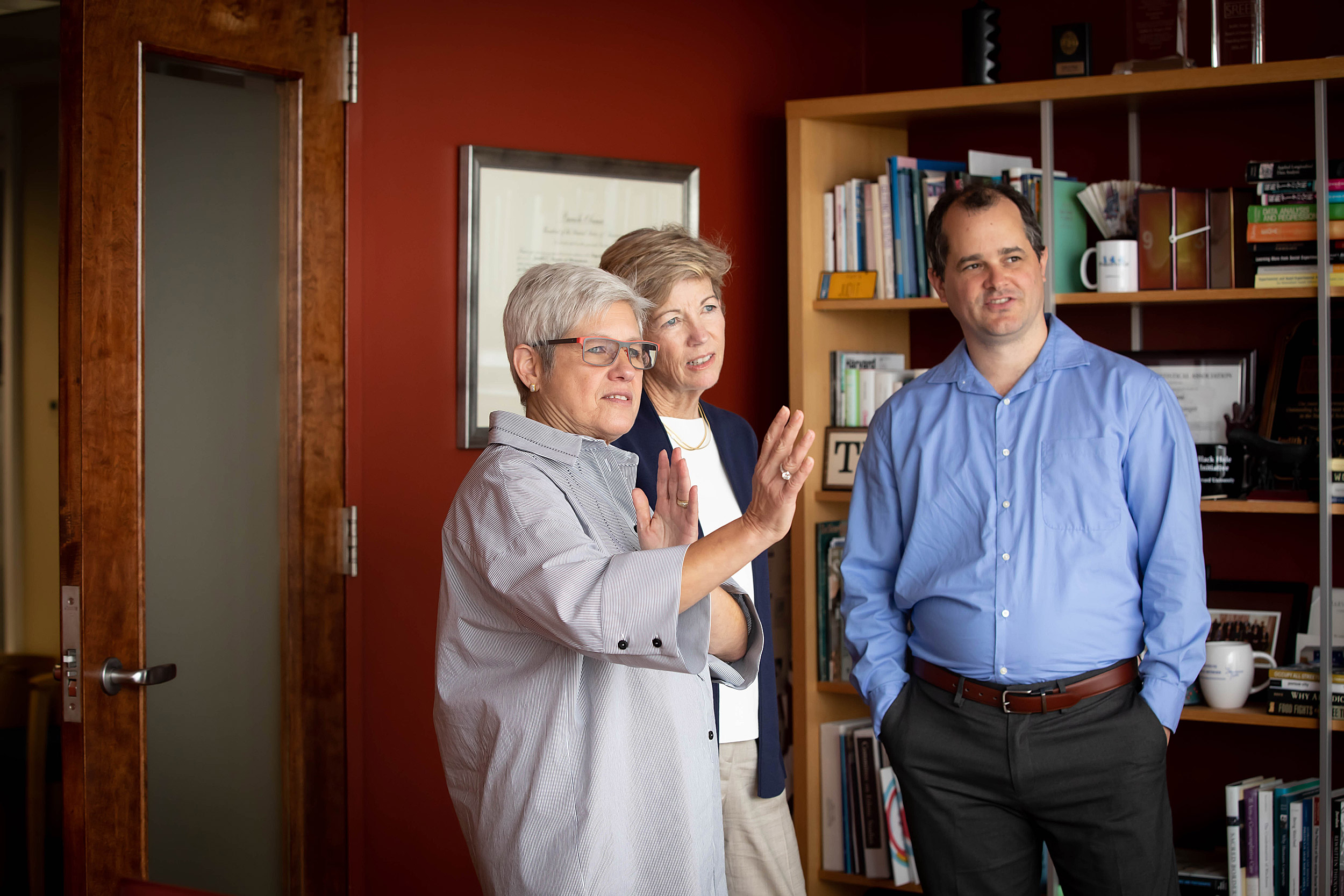
Judy Singer (from left), Anne Margulies, and Dustin Tingley helped create Harvard Link, a platform to connect Harvard faculty members to one another across disciplines.
Rose Lincoln/Harvard Staff Photographer
A link across campus
New platform connects the Harvard community across Schools, disciplines, and programs
Say you teach Slavic languages and literatures, write about literature and political power, and are a devotee of roots music and French New Wave films.
When you log into the new Harvard Link, an online app developed by the research arm of the Office of the Vice Provost for Advances in Learning (VPAL), it will create a personalized dashboard for you, secured by HarvardKey, that will recommend news stories about your academic or geopolitical interests; events like concerts, screenings or lectures; and suggestions on which faculty, staff, centers, initiatives, programs, and organizations work in fields related to yours so you can find out more about what they’re working on — and possibly even whether they would be interested in a collaboration.
The best part? The application does much of this on its own.
Harvard Link funnels publicly available University-related information about the campus, faculty, and staff into a centralized database. It creates suggestions based on a user’s personal, professional, and research interests, which the system automatically collects and individuals can update.
The system also tells faculty members what courses their students are taking before, during, and after enrolling in their class. They can learn who teaches those classes and download syllabi. This is meant to provide professors with a clearer understanding of their students’ academic interests and encourage faculty to connect with colleagues with whom they share students. Link also lets faculty know about other courses at the University that may be related to their own subject.
“Link tries to reduce the costs individuals can face when trying to tap into this treasure trove of information and opportunity,” said Dustin Tingley, a professor of government and deputy vice provost for advances in learning.
The database, updated daily, sits on more than 46,000 data points VPAL collected from across the University and other channels, including public faculty websites, course and enrollment data from my.harvard, syllabi from Harvard Canvas, calendars across Schools and organizations, and stories and news feeds from the Harvard Gazette and Harvard Schools.
The information is searchable, and users can apply filters to narrow results, allowing them to find potential collaborators outside of their department or at a specific school. It will also serve as one of the best ways to find experts at Harvard through keyword searches across news, events, people, and organizations.
“One reason people are so excited about this is because we’re creating something innovative and useful based on existing Harvard systems,” said Zachary Wang, manager for resources adoption and impact at the Harvard Initiative for Learning and Teaching. “By using text analytics to create personalized suggestions, we’re using that infrastructure to take the next step toward One Harvard.”
Powering Link’s recommendation matrix is the professional interests and keywords users have listed in their profiles. That information is matched with other user profiles and the rest of the data the system has on tap.
If users want the ease of having the system create these for them, they can upload a link to their professional website so Link can analyze it using its natural-language processing system, a technology that helps computers understand human language. For faculty members, this has already been done, including any on OpenScholar. Those who don’t have a website or who want to improve the quality of Link’s suggestions can input keywords associated with their interests.
Along with the dashboards, Harvard Link contains weblinks to campus resources and those specific to the user’s School, department, or office. Users can add custom links as needed.
Wang said there are plans to add more features to the site, including a pipeline for research funding opportunities.
VPAL was established in 2013 to oversee initiatives such as HarvardX, the University’s online learning platform. For Harvard Link, it collaborated with Harvard University Information Technology, the Faculty of Arts and Sciences, the Institute for Quantitative Social Science, and the Office of Faculty Development & Diversity.
In its current version, Harvard Link is available only to faculty and staff. VPAL hopes to make it available to students in the future.




